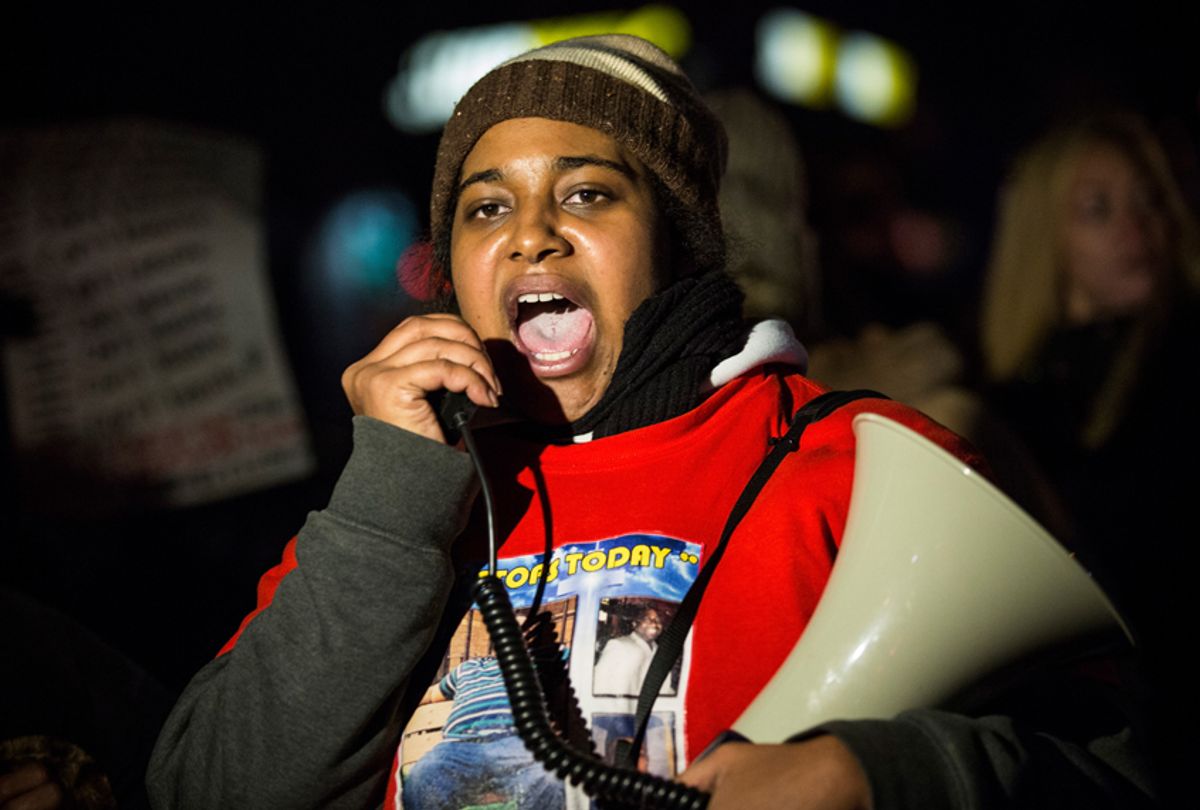Approximately 1,129 people were killed by the police in 2017, according to findings by Mapping Police Violence. In just 12 of these cases, or 1 percent of all police killings, officers were charged with a crime.
With President Donald Trump taunting his way into nuclear warfare and the flood of sexual misconduct allegations that has dominated the news cycle, police brutality seems to have slipped out of mainstream news and national coverage. But as Mapping Police Violence illustrates, the problem of police brutality continues to take lives, as the organization claims, in largely preventable ways.
"Our analysis suggests the majority of killings by police in 2017 could have been prevented and that specific policies and practices might prevent police killings in the future," the organization says, citing that "Most killings began with police responding to suspected non-violent offenses or cases where no crime was reported. 87 people were killed after police stopped them for a traffic violation."
Further, 147 people killed by the police in 2017 were unarmed, though over 100 more killed by the police were listed as having "a vehicle as a weapon."
People of color continue to die at a disproportional rate in these incidents. A full 86 of the 147 unarmed victims of police killings in 2017 were of color, and specifically, "Black people were more likely to be killed by police, more likely to be unarmed and less likely to be threatening someone when killed," Mapping Police Violence reported.
Mapping Police Violence said it compiled data from obituaries, public records, media reports, Fatal Encounters (a database of people killed by the police), and the Washington Post's "Fatal Force" project.
The report noted that half of the people killed by the police in 2017 were reportedly armed with a gun, but one in five of those killed last year were not threatening or attacking anyone at their time of death. Overall, the numbers paint the picture of a tendency toward violent, asymmetrical overreaction, one that is perhaps somewhat inevitable given the training most law officers receive. "Police recruits spend 7x as many hours training to shoot than they do training to de-escalate situations," Mapping Police Violence said. That tally follows similar numbers from similar studies. If police were able to successfully de-escalate the situations where a person was armed, police killings would have seen a 58 percent reduction, or 632 fewer deaths, the report estimates.
These numbers, findings and statistics are stark and daunting. But the grim figures only show some of the total cost of unchecked police violence. There are lost lives not documented here.
Erica Garner, daughter of Eric Garner, died at just 27 years old from a heart attack last week. Her father's death was famously caught on camera: him, unarmed, and repeating "I can't breathe" 11 times, as officer Daniel Pantaleo tightened his grip around Garner's neck, suffocating him to death with a banned chokehold, all for the crime of allegedly selling loose cigarettes. It's a video that shocked the nation, such that the last words Garner uttered before his death became an oft-repeated cry in the fight against police brutality.
After her father's very public death in 2014, Erica Garner committed her life to finding justice for him and all others unnecessarily, recklessly killed by the police.
In the New York Times, Kashana Cauley wrote:
One way to describe Erica Garner’s last few years is to say she spent them fighting against police brutality. Another way is to say she fought against the forced separation and destruction of black families by the state. And that fight may have killed her, just as it might have killed the mother of Kalief Browder, a young man who had been unjustly accused of a minor crime and sent to Rikers Island, where he spent two horrific years in solitary confinement.
"They do these things for you to give up," Erica Garner said in an interview last month. "Look at Kalief Browder’s mother. She died of a broken heart because she kept fighting for her son." She added, "I’m struggling right now, with the stress and everything."
"The system," she said, "beats you down to where you can’t win."
It's not too much to think that the system, which claimed the father, also contributed to the death of the daughter.
Despite Eric Garner's death being ruled as a homicide, Pantaleo was not indicted, leaving it a killing with no culprit. Not only was the Garner family devastated by his loss, but they were also forced to seek justice without the support of the system that is supposed to provide it, a task that very well may have killed Erica.
Erica Garner's official death is attributed to natural causes, but as Rev. Al Sharpton said, "Erica Garner's heart was broken over three years ago when the justice system failed to give her any kind of justice for her father. The heart attack she suffered was on the pieces that were already broken."
It's these deaths — Erica Garner, Kalief Browder's mother Venida and others — that spell out with tombstones how police killings and state violence don't end with the first victim for many black families and in many black communities. Too often, the effect of one bullet, one beating, or one chokehold ripples far beyond the damage it does to one body.
And so, curbing police violence, ending these needless killings of black people, wouldn't just save those in the gunsights of the officers paid to protect and defend. It would help keep alive the Ericas, Venidas, and others, disrupting a system that tragically engulfs many black families as collateral damage.



Shares